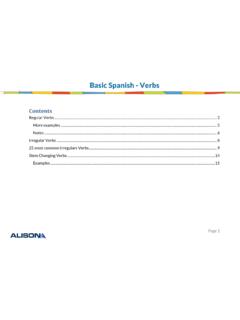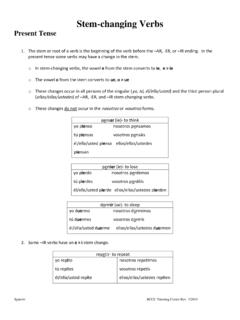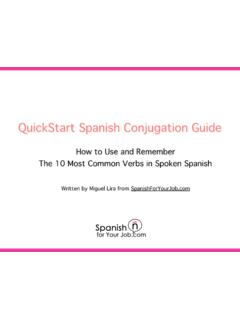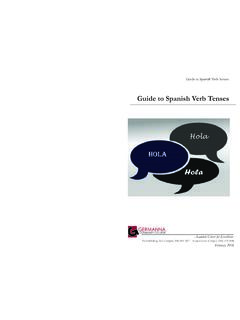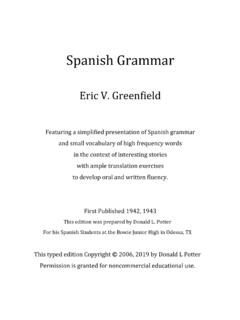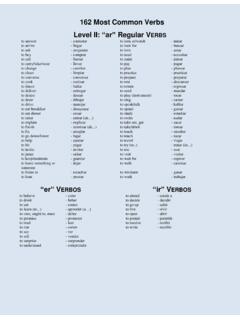Transcription of Spanish Verbs and Essential Grammar Review - Smith Rivas
1 Spanish VerbsandEssential GrammarReviewPrepared by: Professor Carmen L. Torres-RoblesDepartment of Foreign Languages & LiteraturesPurdue University CalumetRevised: 1 /2003 Layout by: Nancy J. Tilka2 CONTENTSS panish VerbsIntroduction 4 Indicative Mood 5 simple & compound tenses: present, past, future, conditionalSubjunctive Mood 12 simple & compound tenses: present, pastSer / Estar 16 Essential GrammarPronouns 20 Possesive Adjectives and Pronouns 23 Prepositional Pronouns 25 Por versus Para 27 Comparisons / Superlatives 31 Preterite / Imperfect 34 Subjunctive Mood 37 Commands 42 Passive Voice 463 Spanish Verbs4 INTRODUCTIONVERBS (VERBOS)MOODS (MODOS)There are three moods or ways to express Verbs (actions) in Indicative Mood (objective)2.
2 Subjunctive Mood (subjective)3. Imperative Mood (commands)INFINITIVES (INFINITIVOS)A verb in the purest form (without a noun or subject pronoun to perform the action) is called aninfinitive. The infinitives in English are characterized by the prefix to + verb form , the Spanishinfinitives are identified by the r , comer, dormir to study, to eat, to sleepCONJUGATIONS (CONJUGACIONES) Spanish Verbs are grouped in three categories or Infinitives ending in ar belong to the first conjugation.(estudiar)2. Infinitives ending in er belong to the second conjugation.(comer)3. Infinitives ending in ir belong to the third conjugation.(dormir) verb STRUCTURE (ESTRUCTURA VERBAL) Spanish Verbs are divided into three parts. (infinitive: estudiar)1. Stem or Root(estudi-)2. Theme Vowel(-a-)3. "R" Ending(-r)CONJUGATED Verbs (VERBOS CONJUGADOS)To conjugate a verb , a verb must have an explicit subject noun (ex: Mar a), a subject pronoun (yo, t ,usted, l, ella, nosotros(as), vosotros(as), ustedes, ellos, ellas), or an implicit subject, to indicate theperformer of the action.
3 *ATTENTION*Subject pronouns are not used as frequently in Spanish as in English. They are used mainly foremphasis or clarification in Spanish since the ending of the conjugated verb often indicates the subjectperforming the (TIEMPOS)Actions ( Verbs ) can be expressed either in the present, past, future, or conditional tenses. They appearin either simple or compound Verbs (VERBOS REGULARES/IRREGULARES) Verbs that do not require changes in their stems are considered regular. Verbs requiring spelling orstem changes are considered MOOD(SIMPLE TENSES)PRESENT TENSEREGULAR VERBSThe present tense endings for regular Verbs are as follows:-ar conjugation-er conjugation-ir conjugation-o-amos-o-emos-o-imos-as- is-es- is-es- s-a-an-e-en-e-enhablar (to speak)comer (to eat)vivir (to live)hablohablamoscomocomemosvivovivimos hablashabl iscomescom isvivesviv shablahablancomecomenvivevivenIRREGULAR VERBS1. Irregular yo FormThe Verbs listed below are irregular only in the yo (to make; to do)hagoponer(to put)pongotraer(to bring)traigosalir(to leave; to go out)salgovaler(to be worth)valgocaer(to fall)caigoExampleinfinitive+ z + coconocer(to know)conozcodesaparecer(to disappear)desaparezcoobedecer (to obey)obedezcoproducir(to produce)produzcoconducir(to drive)conduzcotraducir(to translate)traduzcoExampleinfinitivegu fi godistinguir(to distinguish)distingoExampleinfinitivecer fi zoconvencer (to convince)convenzo6 Exampleinfinitiveg fi jocoger (to pick, take)cojoescoger (to choose)escojoproteger (to protect)protejodirigir (to manage)dirijoexigir (to demand)exijo2.
4 Stem-Changing VerbsThe following Verbs are irregular in the stem when conjugated, except* in the nosotros and fi ieo fi uee fi icerrar (to close)dormir (to sleep)pedir (to ask)cierroduermopidocierrasduermespidesc ierraduermepidecerramos*dormimos*pedimos *cerr is*dorm s*ped s*cierranduermenpiden3. Irregular "yo" Forms + Stem-ChangingThe following Verbs are irregular in the yo form and irregular in the stem when conjugated except*in the nosotros and vosotros + stem changetener (to have)tengo / tienes / tiene / tenemos* / ten is* / tienenvenir (to come)vengo / vienes / viene / venimos* / ven s* / vienendecir (to tell; to say)digo / dices / dice / decimos* / dec s* / dicenconseguir (to get; to obtain)consigo / consigues / consigue / conseguimos* /consegu s* / consiguen4. Jugar (to play)This verb behaves like a stem-changing verb . An e must be inserted except* in the nosotros andvosotros / juegas / juega / jugamos* / jug is* / juegan5. Distribuir (to distribute)To avoid the presence of three vowels in a row, this verb requires the ui to change to uy, except*in the nosotros and vosotros forms.
5 Other similar Verbs also follow this / distribuyes / distribuye /distribuimos* / distribu s* / distribuyen7 OTHER IRREGULAR Verbs ser(to be)soy / eres / es / somos / sois / son estar(to be)estoy / est s / est / estamos / est is / est n ir(to go)voy / vas /va / vamos / vais / van dar(to give)doy / das / da / damos / dais / dan oler(to smell)huelo / hueles / huele / olemos / ol is / huelen haber(aux verb =to have)he / has / ha / hemos / hab is / hanPAST TENSESS panish has two simple past tenses, the imperfect and the TENSE: REGULAR VERBSThe imperfect endings for regular Verbs are as follows:-ar conjugations-er conjugations-ir conjugations-aba- bamos- a- amos- a- amos-abas- bais- as- ais- as- ais-aba-aban- a- an- a- anestudiarcomervivirestudiabaestudi bamoscom acom amosviv aviv amosestudiabasestudi baiscom ascom aisviv asviv aisestudiabaestudiabancom acom anviv aviv anIMPERFECT TENSE: IRREGULAR VERBST here are only three irregular Verbs in the imperfect tense. serirverera ramosiba bamosve ave amoseras raisibas baisve asve aiseraeranibaibanve ave an*ATTENTION*There are no stem-changing Verbs in the imperfect TENSE: REGULAR VERBSThe preterite tense endings for regular Verbs are as follows:-ar conjugations-er conjugations-ir conjugations- -amos- -imos- -imos-aste-asteis-iste-isteis-iste-istei s- -aron-i -ieron-i -ieroncantarcomervivir8cant cantamoscom comimosviv vivimoscantastecantasteiscomistecomistei svivistevivisteiscant cantaroncomi comieronvivi vivieronPRETERITE TENSE: IRREGULAR VERBS1.
6 Spelling-ChangingVerbs. -ar Verbs with irregular yo formExamplecfiqubuscarbusqu gfigullegarllegu zficempezarempec -er Verbs with irregular third person singular and plural formsExamplecaerficay / cayeroncreerficrey / creyeronleerfiley / leyeron -ir Verbs with irregular third person singular and plural formsExampleo rfioy / oyeron2. Stem-Changing Verbs . This change only occurs with certain ir Verbs in the third person singularand plural forms. There are no stem-changing ar or er / pidieronofiudormirdurmi / durmieronPRETERITE TENSE: IRREGULAR Verbs (IRREGULAR ENDINGS)Certain -ar / -er / -ir Verbs are irregular in the stem and also have the following irregular endings:-e-imos-iste-isteis-o-ieron / -eron1. -uv- / -u- in the stemExampleandaranduve / anduviste / anduvo / anduvimos / anduvisteis / anduvieronestarestuve / estuviste / estuvo / estuvimos / estuvisteis / estuvierontenertuve / tuviste / tuvo / tuvimos / tuvisteis / tuvieronhaberhube / hubiste / hubo / hubimos / hubisteis / hubieron9poderpude / pudiste / pudo / pudimos / pudisteis / pudieronponerpuse / pusiste / puso / pusimos / pusisteis / pusieronsabersupe / supiste / supo / supimos / supisteis / supieron2.
7 -i- in the stemExamplequererquise / quisiste / quiso / quisimos / quisisteis / quisieronvenirvine / viniste / vino / vinimos / vinisteis / vinieron3. -i- in the stem + c fi z (third person singular)Examplehacerhice / hiciste / hizo / hicimos / hicisteis / hicieron4. -j- in the stem + ieron fi eron (third person plural)Exampledecirdije / dijiste / dijo / dijimos / dijisteis / dijeronproducirproduje / produjiste / produjo /produjimos / produjisteis / produjerontraertraje / trajiste / trajo / trajimos / trajisteis / trajeron(For uses of the imperfect and preterite, see pages 30-32.)FUTURE TENSEThe future tense corresponds to the English will or VERBSThe future tense endings for regular Verbs are formed by adding the endings below to the -emos- s- is- - n-ar conjugation-er conjugaton-ir conjugationestudiar estudiaremoscomer comeremosvivir viviremosestudiar sestudiar iscomer scomer isvivir svivir isestudiar estudiar ncomer comer nvivir vivir nIRREGULAR Verbs (ONLY IN THE STEM)
8 These Verbs use the regular future endings, however there is a change in the stem before adding fi pondr-poder fi podr-salir fi saldr-tener fi tendr-valer fi valdr-venir fi vendr-saber fi sabr-haber fi habr-querer fi querr-hacer fi har-decir fi dir-10 CONDITIONAL TENSEThe conditional tense corresponds to the English VERBSLike the future tense, the conditional tense is formed by adding the conditional endings below to a- amos- as- ais- a- an-ar conjugation-er conjugation-ie conjugationestudiar aestudiar amoscomer acomer amosvivir avivir amosestudiar asestudiar aiscomer ascomer aisvivir asvivir aisestudiar aestudiar ancomer acomer anvivir avivir anIRREGULAR Verbs (ONLY IN THE STEM)All Verbs considered irregular in the future tense, are also considered irregular in the conditional to use the conditional endings. The irregular stems are the same as in the future tense.(COMPOUND TENSES)Compound tenses are formed with the appropriate conjugated form of the auxiliary verb haber(to have)+ past participle (regular or irregular form).
9 REGULAR PAST PARTICIPLESTo form regular past participles of ar conjugations, add the ending ado to the stem. For er and irconjugations, add the ending ido to the fiestudiado (studied)comerficomido (eaten)vivirfivivido (lived)IRREGULAR PAST PARTICIPLEST here are no irregular past participles for ar conjugation Verbs . The following er and ir Verbs haveirregular past conjugationpast participle-ir conjugation past participleenvolverenvuelto (wrapped)abrir abierto (opened)devolverdevuelto (returned: things)cubrircubierto (covered)hacerhecho (done)decirdicho (said)ponerpuesto (placed)descubrirdescubierto (discovered)romperroto (broken)morirmuerto (dead)resolverresuelto (resolved)escribirescrito (written)vervisto (seen)volvervuelto (returned)11 PRESENT PERFECT TENSEThe present perfect tense is formed by using the present tense of the auxiliary verb haber (conjugatedbelow in the present indicative) + past participle (regular or irregular form).haber (present tense)hehemoshashab ishahanExampleHe estudiado la lecci have studied the comido la have eaten the dormido has slept escrito la have written the hecho la have done the PERFECT TENSE (PLUPERFECT)The past perfect is formed by using the imperfect tense of the auxiliary verb haber (conjugated belowin the imperfect indicative) + past participle (regular or irregular form).
10 Haber (impefect tense)hab ahab amoshab ashab aishab ahab anExampleHab a estudiado la lecci had studied the as comido la had eaten the a dormido had slept amos escrito la had written the an hecho la had done the PERFECT TENSEThe future perfect is formed by using the future tense of the auxiliary verb haber (conjugated below inthe future indicative) + past participle (regular or irregular form).haber (future tense)habr habremoshabr shabr ishabr habr nExampleHabr estudiado la lecci will have studied the s comido la will have eaten the dormido will have slept escrito la will have written the n hecho la will have done the PERFECT TENSEThe conditional perfect is formed by using the conditional tense of the auxiliary verb haber (conjugatedbelow in the conditional tense) + past participle (regular or irregular form).haber (conditional tense)habr ahabr amoshabr ashabr aishabr ahabr anExampleHabr a estudiado la lecci would have studied the as comido la would have eaten the a dormido would have slept amos escrito la would have written the an hecho la would have done the MOOD(SIMPLE TENSES)PRESENT TENSEThe present tense of the subjunctive mood is equivalent to the English auxiliary verb VERBSThe present tense endings for regular Verbs in the subjunctive mood are as follows:ar conjugation-er conjugation-ir conjugation-e-emos-a-amos-a-amos-es- is-as- is-as- is-e-en-a-an-a-anestudiarcomervivirestud ieestudiemoscomacomamosvivavivamosestudi esestudi iscomascom isvivasviv isestudieestudiencomacomanvivavivanIRREG ULAR VERBS1.
